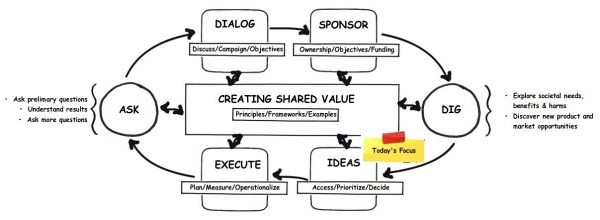Suppose you are ready to Pair Passion with Purpose to Create Shared Value. You’ve asked yourself the key questions to begin Enabling Shared Value and you are excited to get started. Key to the success of your mission is creating awareness and initiating a dialog that educates and motivates others to support this movement.

When I started on my journey and began talking about inspiring the creation of Shared Value, I encountered a very predictable response from those around me. I discovered that people respond very skeptically to ideas that merge concepts of philanthropy and profitability. In fact, many people passionately dismiss the merits of this merge right out of the gate, reinforcing the false belief that philanthropy and profitability are mutually exclusive concepts. At first I was frustrated and perplexed by this, it seemed highly irrational to me. The responses I was observing were not a reflection of anyone’s intellect, ego or rigidity; in fact they were coming from some of the most brilliant, open-minded people I knew. What I quickly learned was that I had to frame my discussions based on these predictive yet somewhat irrational responses.
At a very broad level, there are three types of personas that will drive the context of how to approach talking about Shared Value.
- Entrepreneurs: our business community at large; our traditional capitalists
- Noblemen: our giving community; our traditional philanthropists
- Socialpreneurs: a relatively small group who is pioneering many of the concepts of creating Shared Value but typically weights social progress over profitability
We need to bring all three of these personas onto the same team – one that enables us to create profits with purpose and unleash mass collaboration. Engaging in conversations uniquely designed to motivate new behaviours from each persona is key to establishing a new dialog for change. The goal here is not to force change, but rather to bridge the benefits in a context that resonates.
Entrepreneurs and noblemen are diametrically opposed in their strengths and weaknesses, which drives the initial irrational responses you may encounter. Prepare to have multiple evolving discussions; this kind of revolutionary change takes patience and tenacity. Here are some suggested strategies to begin your Shared Value dialog:
- Use lots of examples, providing details of the process and the results. Demonstrate the diversity of case studies and encourage idea sharing on similar initiatives that would enable you to create profits with purpose. My personal favourite example is Nestle.
- When engaging entrepreneurs, appeal to their motivators and use their dialog. “Profits with purpose” tends to resonate much better than focusing on potential social progress. Emphasize impact on financial performance, employee and customer experience, and costs associated with social issues.
- Noblemen are very distrusting of traditional entrepreneurial ways, and with good cause. The key to their hearts is transparency and accountability. Transparency is essential to the success of creating Shared Value. Emphasis on the impact of mass collaboration to address social issues and enable prosperity for local communities will motivate rich discussions with philanthropists.
- While facts are essential, imagination and creative thinking are powerful to help illustrate where creating Shared Value will bring us. For example, imagine going to the grocery store and using your mobile phone to scan an item. Voila, you discover not only the nutritional information but also the social impact of the product. This technology exists and we are closer than you think to making these possibilities a reality.
I recently had the privilege of being featured on the Customer Experience Show, where I was interviewed about Making Profits with Purpose for a Better Customer Experience. This is a great example of an introductory discussion on creating Shared Value that you can hold with entrepreneurs.
After your first few discussions, you will begin to notice that Shared Value concepts start to have relevance in almost every topic. As this happens, begin to capture the objectives you are observing. Doing so will be helpful in attaining sponsorship as you move forward. This will be the topic for my next article; this is where we start to give this movement wings.






